Beneficial properties of Brussels sprouts and their value for the body
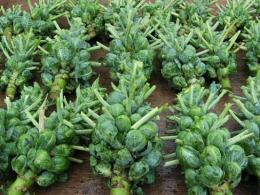
Among many vegetable crops, Brussels sprouts rank first in terms of the amount of beneficial minerals and vitamins it contains, as well as nutrients.
This vegetable crop has found its use not only in cooking, but also in medicine. It's hard to argue with the fact that Brussels sprouts has long occupied a certain place in the food chain in the category of healthy products.
Many experts speak out about the positive effect it brings to our body. Therefore, whether you grow it yourself or simply buy it, the effect on your body should be very favorable.
Content:
What are Brussels sprouts
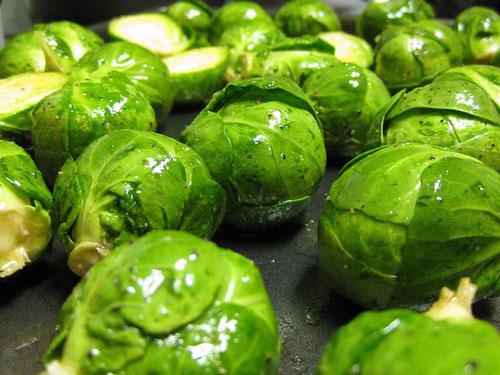
Brussels sprouts are a biennial vegetable crop of the Cruciferous family. After the first year of growing season, the crop forms a stem, which can reach a height of up to 70 cm.
Long-petioled leaves develop on the stem, which are arranged alternately. In the axils of the leaves, the ovary of small heads of cabbage occurs, which do not exceed 4 cm in diameter. About 60 such heads of cabbage can grow on one plant.
Thanks to its powerful root system, the plant tolerates lack of moisture well, which cannot be said about other varieties of this vegetable crop. Cabbage is usually grown using seedlings.
The best temperature for seed germination is 18-20 degrees, and for seedlings no more than 15 degrees. Brussels sprouts are characterized by cold resistance and can easily tolerate frosts of up to 10 degrees.
For cultivation, loamy soil with a high humus content is used.
Cabbage has a sweetish and slightly nutty taste, which is why it is so highly valued by gourmets.
It is used for preparing main courses, various salads, and soups. It can be baked, stewed, dried, pickled, boiled and canned.
It is not advisable to store cabbage for a long time. It is better to eat Brussels sprouts fresh or processed.
What are the benefits of Brussels sprouts?
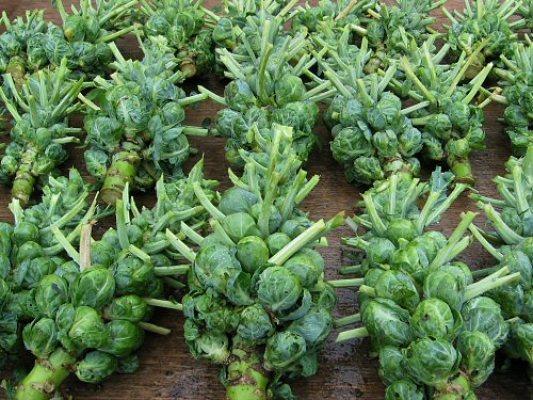
Among all products of plant origin, Brussels sprouts take first place in terms of the content of useful substances for the human body. Cabbage contains various vitamins and mineral amino acids:
- Vitamins B, C and K
- Sodium
- Potassium
- Iron
- Iodine
- Folic acid
- Carotene
- Riboflavin
Cabbage contains a large amount of carbohydrates and proteins, fiber, crude protein, and starch.
Brussels sprouts are recommended for pregnant women. Folic acid is especially necessary for women in the first trimester of pregnancy.
Eating Brussels sprouts has a beneficial effect on all human systems and many organs. Cabbage has a general strengthening, immunostimulating, anti-inflammatory, hematopoietic, and anti-atherosclerosis effect.
Cabbage juice has expectorant, laxative, diuretic and choleretic properties. This vegetable crop is recommended for consumption by people suffering from cardiovascular diseases.
Thanks to its strong anti-inflammatory properties, eating cabbage reduces the risk of inflammation in the blood vessels and heart.
The glucosinolates it contains reduce damage to the walls of blood vessels.
Brussels sprouts prevent the formation and development of diabetes, neoplasms, and goiter. In addition, this vegetable crop has the following healing properties:
- Reduces cholesterol levels
- Reduces the risk of developing colds
- Restores the functioning of the pancreas
- Improves vision
- Eliminates heartburn
- Reduces the occurrence of birth defects
- Boosts immunity
Vitamin K has a beneficial effect on brain function. This vitamin also stimulates wound healing and is used during the recovery period after surgery.
Brussels sprouts are used for preventive purposes against constipation. With regular consumption of cabbage, the functioning of the digestive system is normalized.
Some B vitamins (B6, B12) improve mood and help get rid of depression.
Due to its low calorie content (35 kcal per 100 g), Brussels sprouts are classified as dietary products.
Brussels sprouts are harmful
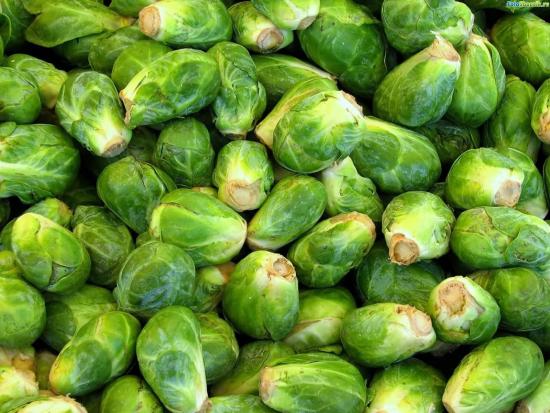
Brussels sprouts are famous not only for their beneficial properties. For some diseases, eating cabbage can harm the body.
Eating vegetables is not recommended for peptic ulcers, exacerbations of gastrointestinal diseases and disorders of the thyroid gland.
Should be introduced into the diet with caution cabbage people with high stomach acidity.
If there are disturbances in the functioning of the thyroid gland, then eating cabbage can lead to the development of hypothyroidism.
Geitrogens are substances present in cabbage that can suppress the production of thyroid hormones.
Indoles contained in vegetables interfere with the absorption of a sufficient amount of iodine. With irritable bowel syndrome, bloating often occurs after eating cabbage.
Fructanates contribute to increased gas formation. These substances are fructose residues. In this case, to get rid of bloating, you should stop eating this vegetable.
Video about the benefits of Brussels sprouts:
Interesting information about the vegetable garden


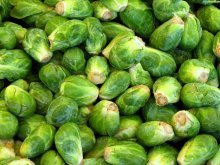




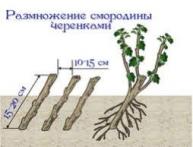

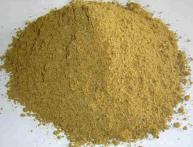

Comments
I love cabbage in any form, and I just adore Brussels sprouts. I tried to grow it somehow, but a very small amount of cabbage grew on the stem. Maybe you just got poor quality seeds.